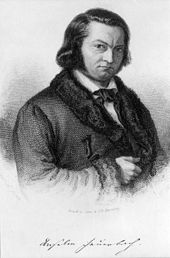Joseph Anselm Feuerbach
Joseph Anselm Feuerbach (born September 9, 1798 in Jena ; † September 8, 1851 in Freiburg ) was a German classical philologist and classical archaeologist .
Life
Joseph Anselm Feuerbach was born as the eldest son of the prominent legal scholar Paul Johann Anselm Ritter von Feuerbach in Jena and spent the first few years in different cities. From 1814 he attended grammar school in Bamberg and in 1817 moved to the University of Erlangen , where he first studied history and philosophy, then theology under the influence of Johann Arnold Kanne (1773-1824) . During his studies he became a member of the Ansbacher Landsmannschaft in Erlangen, was a founding member of the Erlangen fraternity in 1817 and joined the old Heidelberg fraternity in 1820 . After an illness he suffered all his life from depression and a nervous disease, which he first successfully fought through a “cure” in the Dresden artist circle of Elisa von der Recke .
In 1820 he returned to his studies at the Ruprecht-Karls-Universität Heidelberg , where he now studied archeology and philology. After a further interruption due to his nervous disease, he passed the philological state examination in 1824 and in 1825 became a teacher at a grammar school in Speyer . During this time as a teacher he worked on his only major work, The Vatican Apollo. A series of archaeological-aesthetic considerations (1833), which earned him an appointment as professor at the University of Freiburg in 1836 . There he was mainly active as an academic teacher until his death in 1851. Since 1848 he was a foreign member of the Bavarian Academy of Sciences .
Joseph Anselm Feuerbach is the father of the painter Anselm Feuerbach . In his second marriage he was married to Henriette Feuerbach , the sister of the doctor Friedrich Wilhelm Heidenreich .
Joseph Anselm Feuerbach is buried in the old cemetery in Freiburg im Breisgau. The Freiburg sculptor Josef Alois Knittel created his tomb .
Works
- The Vatican Apollo. A series of archaeological-aesthetic considerations . Nuremberg 1833; 2nd edition, Stuttgart 1855.
-
Legacy writings . Braunschweig 1853, 4 volumes.
- 1. Volume: Life, Letters and Poems , ed. by Henriette Feuerbach.
- 2-4 Volume: History of Greek Sculpture and Treatises of Art History , ed. by Hermann Hettner .
literature
- Conrad Bursian : Feuerbach, Joseph Anselm . In: Allgemeine Deutsche Biographie (ADB). Volume 6, Duncker & Humblot, Leipzig 1877, pp. 745-747.
- Feuerbach 2 . In: Meyers Konversations-Lexikon . 4th edition 1888-1889, Volume 6, p. 202.
- Helge Dvorak: Biographical Lexicon of the German Burschenschaft. Volume I: Politicians. Sub-Volume 2: F-H. Winter, Heidelberg 1999, ISBN 3-8253-0809-X , pp. 21-22.
- Martin Flashar : A burned out volcano - On the 150th anniversary of the death of the archaeologist Joseph Anselm Feuerbach . In: Ancient World. Volume 32, 2001, pp. 660–662.
- Martin Flashar : “Commendable Philosophical Faculty!” - Life and work of the archaeologist Joseph Anselm Feuerbach (1798–1851). In: 40 years of Feuerbachhaus (= series of publications by the city of Speyer. Volume 20). Stadtverwaltung, Speyer 2016, pp. 40–85.
Web links
- Feuerbach, Joseph Anselm. Hessian biography. (As of January 15, 2020). In: Landesgeschichtliches Informationssystem Hessen (LAGIS).
- Entry on Joseph Anselm Feuerbach in the Rhineland-Palatinate personal database
Individual evidence
- ^ Michael Klant: The artist family Knittel . In: Freiburg biographies. Promo, Freiburg im Breisgau 2002, ISBN 978-3-923288-33-5 , p. 175.
| personal data | |
|---|---|
| SURNAME | Feuerbach, Joseph Anselm |
| BRIEF DESCRIPTION | German classical philologist and classical archaeologist |
| DATE OF BIRTH | September 9, 1798 |
| PLACE OF BIRTH | Jena |
| DATE OF DEATH | September 8, 1851 |
| Place of death | Freiburg |

